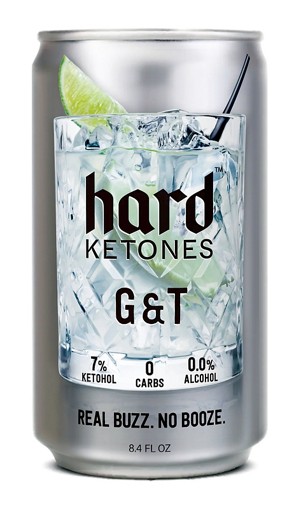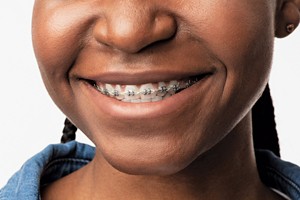SIPPING ON HARD KETONES

Credit: Ketoneaid
Keto cooler: "Booze" for the ultramarathoner, maybe.
A party drink called Hard Ketones is bound to attract the attention of chemists, and the Newscripts gang is no exception. This peculiar line of potables puts (R) -1,3- butanediol where one would usually find ethanol: in a gin and tonic or Moscow mule cocktail. The company behind Hard Ketones, KetoneAid, says the product provides social lubrication and giddiness without the ill effects of alcohol, making it a healthy alternative to conventional drinking.
But the chemistry pitch goes deeper than just the name. Regular old ethanol metabolizes into acetaldehyde, a toxic molecule associated with liver damage and hangovers. (R)-1,3- butanediol, by contrast, gets metabolized to acetoacetate, one of three so-called ketone bodies that mammals make from fat and use for energy when blood sugar isn’t available.
Many dieters and athletes shun carbohydrates by adopting variations of a keto diet—or even starving themselves to get their systems to make ketone bodies. Fans of this metabolic state, called ketosis, say it boosts athletic and mental performance, among other purported benefits. Hard Ketones started off as a sports drink, the firm says, but test subjects reported feeling too buzzed for athletics, so the company pivoted and started selling it as a social beverage.
Kantha Shelke, a chemist and food science consultant, tried Hard Ketones on herself while hooked up to a continuous blood chemistry monitor. “It was not a slam dunk,” she tells Newscripts. It suppressed her hunger, but she didn’t feel any buzz. And though she saw some analytical signs of mild ketosis, she says, it was inconsistent.
Published research backs up the notion that (R) -1,3-butanediol can stimulate production of ketone bodies, Shelke says, but the dosage is tricky to dial in—and everyone is different. The array of nutritional supplements taken by many athletes—the target audience for the drink—makes the efficacy even harder to gauge. “I understand that all these high-performance people consume it, but they also consume so many other things that you don’t know which one is working,” she says.

Credit: Shutterstock
Bracing breath: Can enzymes clean where toothbrushes don't reach?
If you’re biohacking with 1,3-butanediol, why not keep it going with enzymes that keep bad breath at bay?
The biotechnology firm Novozymes recently launched an oral care ingredient that uses enzymes to break down the bad-smelling biofilms that bacteria build on teeth. To prove the products’s plaque-fighting power, the firm recruited 35 Swedish teenagers with braces: the brackets, wires, and bands of conventional orthodontia make it difficult to brush effectively, often leading to bad breath.
In a double-anonymized experiment, half the teens got a mouthwash containing 60 ppm each of one enzyme that degrades DNA and two that break bonds in the polysaccharide glucan. The other half got an otherwise identical control mouthwash. The researchers asked participants to brush and use the mouthwash morning and night and pestered them with twice-daily text message reminders.
After 8 days, the teens who took the enzyme elixir had a measurable and statistically significant reduction in biofilm, 38% better than the control group on a standard measure called the orthodontic plaque index (Eur. J. Orthod. 2022, DOI: 10.1093/ejo/cjac062). Thomas Larsen, an account manager at Novozymes who works with personal care product makers, tells Newscripts that enzyme- enhanced toothpaste trials are now underway.
Anyone looking to add biochemistry to their dental routine will have to do some sleuthing. Larsen says that several consumer products using the ingredient are already on shelves, but he can’t reveal their names because of confidentiality agreements. He hints, though, that hopeful early adopters should look for mouthwash, toothpaste, lozenges, and chewing gum with the words “enzymes” and “oral microbiome” on their labels.











